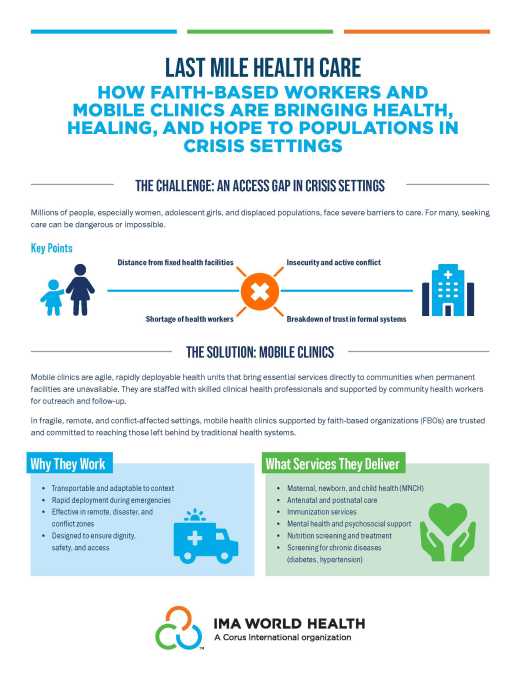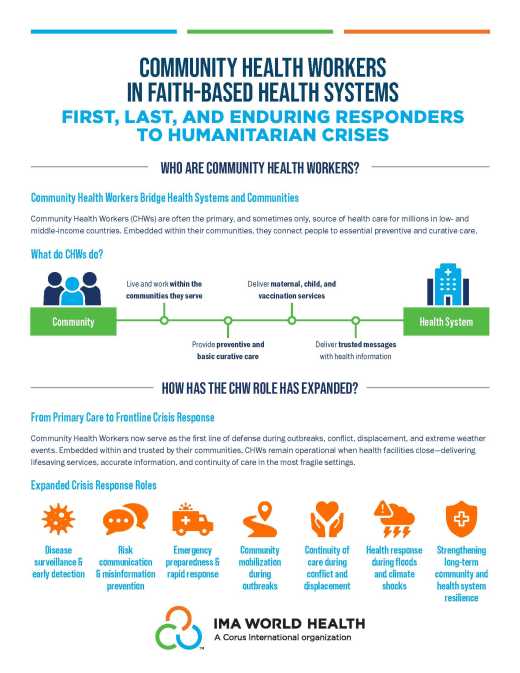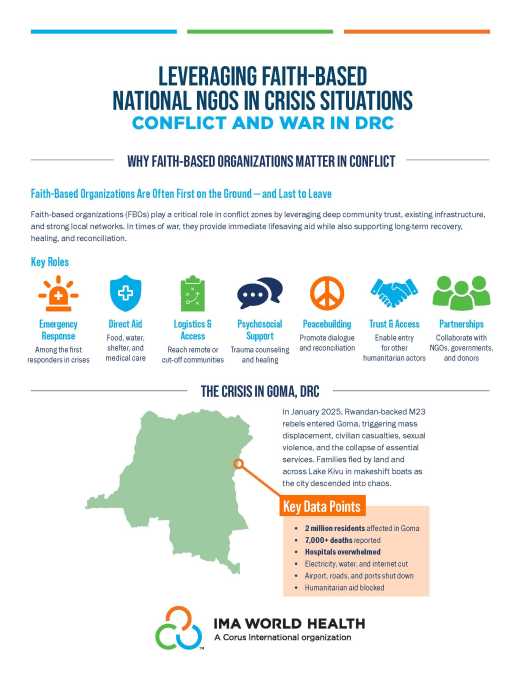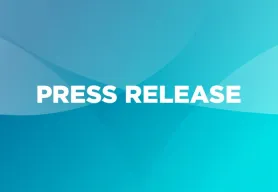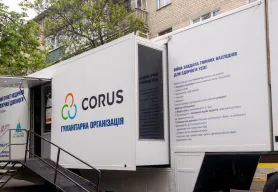IMA World Health's fellow Corus International organization Lutheran World Relief has worked in the the Philippines with impoverished, rural communities since the 1960s, collaborating with them on programs in WASH, nutrition, agriculture and food security, climate change adaptation and disaster risk reduction, and emergency response. Now as partners under Corus, IMA World Health brings a new level of in-depth health expertise to Lutheran World Relief's trusted presence in the region.
Project Highlights
This global health initiative, funded by the Center for Disease Control (CDC) and led by IMA World Health in DRC and the Philippines, focuses on enhancing immunization program capacity. Identifying underserved populations, the projects implement targeted interventions to ensure equitable vaccine access. Key objectives include:
- Establishing comprehensive vaccine-preventable disease (VPD) surveillance systems.
- Improving preparedness and response to VPD outbreaks.
- Strengthening the quality and sustainability of immunization delivery systems.
These efforts are vital to achieving global VPD control, elimination, and eradication goals, such as polio eradication, measles and rubella elimination, hepatitis B elimination, and maternal and neonatal tetanus elimination. Ultimately, the project seeks to significantly reduce VPD-related morbidity and mortality, contributing to healthier communities worldwide.
Led by IMA World Health and funded by the U.S. Department of State, MOMENTUM Integrated Health Resilience is a global health initiative focused on saving the lives of mothers and children in conflict and fragile settings.
MOMENTUM Integrated Health Resilience was originally launched in May 2020 as part of a suite of programs designed to holistically strengthen maternal, newborn, and child health (MNCH) worldwide. Working alongside local organizations, governments, and humanitarian and development partners, the project helped accelerate reductions in maternal, newborn, and child illness and death by increasing the capacity of host country institutions and local organizations to introduce, deliver, scale up, and sustain the use of evidence-based, quality MNCH care.
In 2025, the program refined its focus to deliver quality, integrated and life-saving health, nutrition, and WASH services to mothers and children, detect and respond to disease outbreaks, and distribute essential medicines and commodities. MOMENTUM Integrated Health Resilience is now being implemented in Bangladesh, Benin, Burundi, Democratic Republic of Congo, Ethiopia, Mali, Niger, Philippines, South Sudan, Sudan, Yemen.
Lutheran World Relief is an implementing partner with DAI on USAID's Safe Water Activity, which works with local government units, water service providers, and watershed councils in target provinces to develop and reinforce the systems that underpin and deliver water supply and sanitation services while protecting crucial upstream water resources. Lutheran World Relief engages upland communities in developing environmentally sustainable livelihoods. Specifically, Lutheran World Relief promotes agroforestry and watershed management; links community producers to the corporate value chains; engages private sector stakeholders in water security planning; and develops innovative financing schemes to support upstream watershed, forest, and water resources management activities.
In Northern Cebu, Lutheran World Relief collaborated with the Philippine Business for Social Progress (PBSP) to build the resilience of 1,000 women through livelihood diversification and enterprise development. The project supported capacity building on disaster risk reduction management (DRRM) to increase the participation of women to support disaster preparedness at the enterprise and household levels; and the use of technology and communications to improve access to information on weather, market, employment and financing by working with the private sector.
The FRESH project aimed to improve the food security and livelihoods of 900 vulnerable farming households in the following barangays (villages) in Talacogon, located in the northeast of Mindanao: Causwagan, Del Monte, Labnig, San Agustin, San Nicolas, and Zillovia. FRESH increased farming households’ agricultural production, income, and knowledge of proper health and nutrition practices using the PD-Hearth approach. The project also encouraged the adoption of diversified and integrated farming systems (DIFS) in order to foster nutrition-sensitive crop production. Over 94% of the 288 targeted malnourished children participating in the project reached their normal weight according to their age. This increase was largely attributed to the PD-Hearth approach and promotion of vegetable production and consumption. This success led local governments of other barangays and municipalities to adopt the PD-Hearth approach as well.
With support from the Hilton Foundation, this project focused on four barangays of Ormoc City. Lutheran World Relief trained 66 members of two sanitation committees on WASH activities to eliminate open defecation. Additionally, Lutheran World Relief provided technical support for the construction of over 700 latrines. As a result of the project, the local government was awarded first place in “Best Sanitation Practices 2015” in a citywide competition while also recognizing Lutheran World Relief for its contributions to local WASH development and coordination with local authorities.
In response to Typhoon Haiyan, Lutheran World Relief supported vulnerable populations through projects including non-food items, material resources, cash-for-work (CfW), shelter, water, sanitation and hygiene, livelihood rehabilitation, and disaster risk reduction. By September 2014, achievements included 5,345 shelter repair kits, 4,790 CfW participants, 26,873 distributed items, and training for 489 individuals. In Leyte Province, Lutheran World Relief's WASH project exceeded its goals by building 739 household latrines and six Material Recovery Facilities (MRFs), training locals to construct latrines, and distributing hygiene kits to 2,294 households. The project also reactivated two sanitation committees, trained 66 members in Community-Led Total Sanitation (CLTS), and reached 2,294 households.
Lutheran World Relief and the Center for Empowerment and Resource Development (CERD) built the capacity of Hinatuan’s coastal communities to reduce and manage risks and vulnerabilities associated with coastal hazards, cope and recover from shocks, and adapt to climate change. Lutheran World Relief trained 11 barangays on climate-adaptive technologies, such as garden rain shelters, mulching, elevated gardening and treated seaweed seedlings. Field guides on these technologies were produced for future learning. Communities were also trained in monitoring local weather patterns, sea levels and sea salinity to increase their ability to assess climate risk and self-manage appropriate interventions. The project mobilized and trained 12 Social Protection Committees within fishers’ organizations to educate communities about savings accounts and household plans to guard against calamity. Through this project, 462 households began depositing portions of their income into savings accounts used for children’s education and calamity insurance premiums, and 1,000 individuals formulated household development plans, which included savings and CCA disaster risk reduction technologies and activities.
Working through local partner Mahintana Foundation Inc., Lutheran World Relief addressed and reduced the impact of flooding within farmlands by gradually rehabilitating and protecting the Silway-Klinan River and its tributaries and gullies. Lutheran World Relief strengthened the organizational capacities of local DRR structures, resulting in 13 barangays that have organized Barangay Disaster Risk Reduction and Management Committees (BDRRMC), established emergency policies and instituted a five-year plan for Enhanced Disaster Risk Reduction-Climate Change Adaptation. As a result of training on Ordinance and Resolution Making, 15 ordinances on environmental protection and health promotion were adopted.
The project’s emphasis on women‘s involvement in decision-making was reflected in the election of 36 women to 76 positions of leadership in local People’s Organizations. The ReVIVE project was cited by the Environmental Management Bureau (EMB) of the Department of Environment and Natural Resources (DENR) Philippines Climate Resilient Cities Region 12 as a best practice under its 2013 Water Quality Status Report. The report acknowledged the contribution of the ReVIVE project in enhancing not only the physical attributes, but also the water quality of the river, especially in the reduction of fecal and total coliform bacteria.
Lutheran World Relief's installed women-managed water system facilities in five barangays (villages), giving potable water access to 734 households. The project built the capacity of women’s organizations to successfully manage the water systems and advocate with the government for improved water management. The project leveraged public funds from Gingoog City and concerned barangays to provide technical assistance and financial investments to the water systems.
Founded in 1960, IMA World Health is a leading public health organization that delivers solutions to health-related problems across the developing world. We work with local partners and governments to strengthen existing health systems, prevent and treat diseases, improve maternal and child health, promote nutrition and WASH, respond to sexual and violence against women and girls, and contribute to global health security.
IMA World Health leads global health programming at Corus International, an organization that unites an array of world-class nonprofits and businesses, each with specialized expertise. Our reach and capabilities are amplified by the other global leaders in our Corus International family, including Lutheran World Relief, CGA Technologies and Ground Up Investing. Together, we bring the multi-dimensional, holistic needed to truly achieve lasting change.



